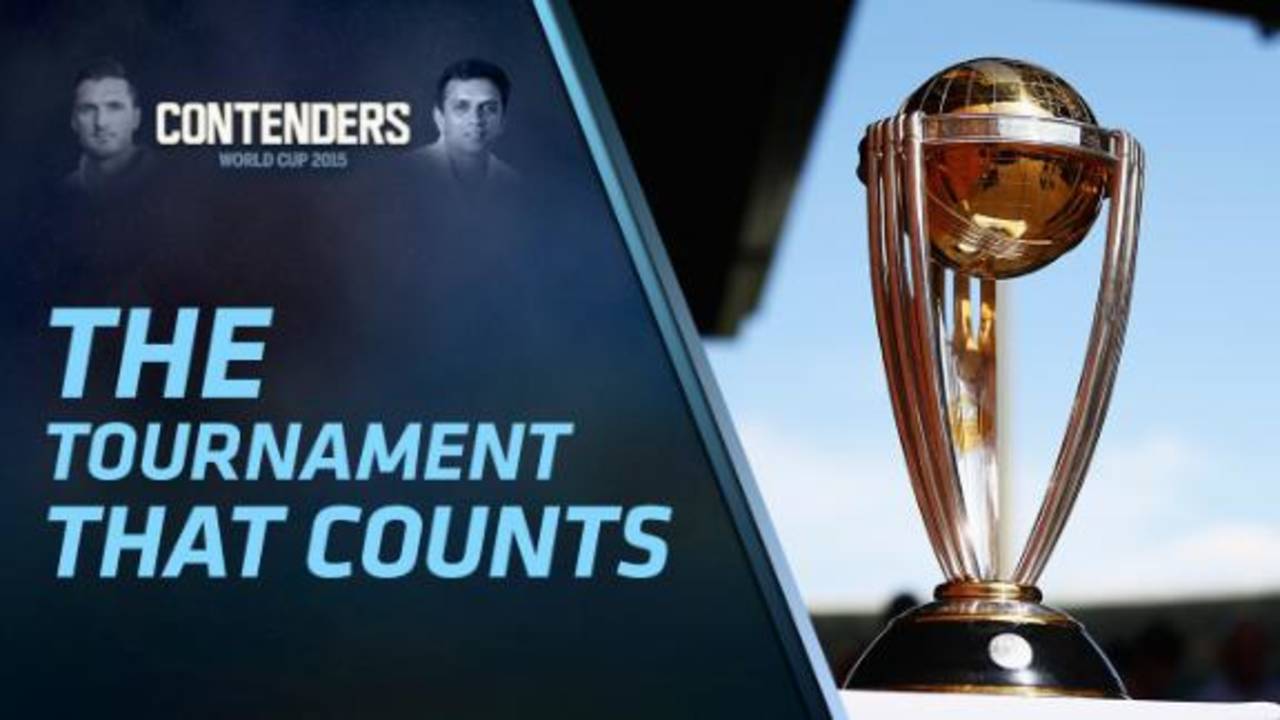'Teams can't have set formula' - Dravid
In the first episode of Contenders, a special ten-part buildup to the 2015 World Cup, Rahul Dravid and Graeme Smith discuss the impact of local conditions on team compositions and the issues surrounding the format of the tournament
ESPNcricinfo staff
20-Jan-2015
As the 2015 World Cup in Australia and New Zealand approaches, excitement is building about what the tournament holds. Who are the players to watch for? Which teams start favourites? Contenders, a ten-part ESPNcricinfo special series, examines the strengths and weaknesses of each team in depth, with two legends of the modern game - former South African captain Graeme Smith and former India captain Rahul Dravid. To kick off the series, Smith and Dravid reflect on the importance of a World Cup for a player, the impact of local conditions on team compositions, the issues surrounding the format of the tournament and the likely effects of the new ODI rules on the games.
What they said about…
Importance of playing a World Cup
Dravid: You want to make a mark in the World Cup, simply because you felt that the best players in the world were playing that tournament.
Smith: I was fortunate enough to play in three of them and never got to win one but have some great memories of those occasions.
Dravid: You want to make a mark in the World Cup, simply because you felt that the best players in the world were playing that tournament.
Smith: I was fortunate enough to play in three of them and never got to win one but have some great memories of those occasions.
Memories of the 1992 tournament
Dravid: I had just started playing first-class cricket. One thing that we observed was the players' colourful uniforms. We used to look at them and think, 'Yes it would be nice to wear one of those someday.'
Smith: That was my first ever sort of exposure into international cricket. When I was 9 or younger, we used to lie on the bedroom floor, wake up at odd hours of the morning and watch television.
Dravid: I had just started playing first-class cricket. One thing that we observed was the players' colourful uniforms. We used to look at them and think, 'Yes it would be nice to wear one of those someday.'
Smith: That was my first ever sort of exposure into international cricket. When I was 9 or younger, we used to lie on the bedroom floor, wake up at odd hours of the morning and watch television.
Impact of local conditions on team composition
Dravid: You can't have one set formula. Even if you are confident enough to qualify as one of the top eight teams, you can never predict where your quarterfinal will be. You've got to have a squad that covers all bases.
Smith: The unique thing about playing in Australia is the size of the grounds, it's one thing that most other nations aren't really used to. You have to put emphasis on scoring singles and running twos and threes.
Dravid: You can't have one set formula. Even if you are confident enough to qualify as one of the top eight teams, you can never predict where your quarterfinal will be. You've got to have a squad that covers all bases.
Smith: The unique thing about playing in Australia is the size of the grounds, it's one thing that most other nations aren't really used to. You have to put emphasis on scoring singles and running twos and threes.
The format of the World Cup
Dravid: You can almost predict who the top eight teams are going to be. There comes a time in the tournament, when everyone starts to wait for the quarterfinals, because you know that those are the big games.
Smith: The experiences I've had with the football World Cup and the rugby World Cup is that every weekend, there's a big challenge, and you're looking forward to the next game. I think that's crucial for us to create to keep cricket on the map and keep it competitive.
Dravid: You can almost predict who the top eight teams are going to be. There comes a time in the tournament, when everyone starts to wait for the quarterfinals, because you know that those are the big games.
Smith: The experiences I've had with the football World Cup and the rugby World Cup is that every weekend, there's a big challenge, and you're looking forward to the next game. I think that's crucial for us to create to keep cricket on the map and keep it competitive.
Impact of new ODI rules
Dravid: When you have five fielders in the ring, it's very hard to play a part-time bowler, you are almost forced to play five specialist bowlers. You're going to be forced to attack and look for wickets than just sit back for long periods of play and see part-timers bowl.
Smith: You need to sum up the batting conditions with the two new balls in Australia and New Zealand. You need to set more of a platform and you can catch up in the last 20 overs if need be. The key is not to go three or four down for nothing.
Dravid: When you have five fielders in the ring, it's very hard to play a part-time bowler, you are almost forced to play five specialist bowlers. You're going to be forced to attack and look for wickets than just sit back for long periods of play and see part-timers bowl.
Smith: You need to sum up the batting conditions with the two new balls in Australia and New Zealand. You need to set more of a platform and you can catch up in the last 20 overs if need be. The key is not to go three or four down for nothing.
